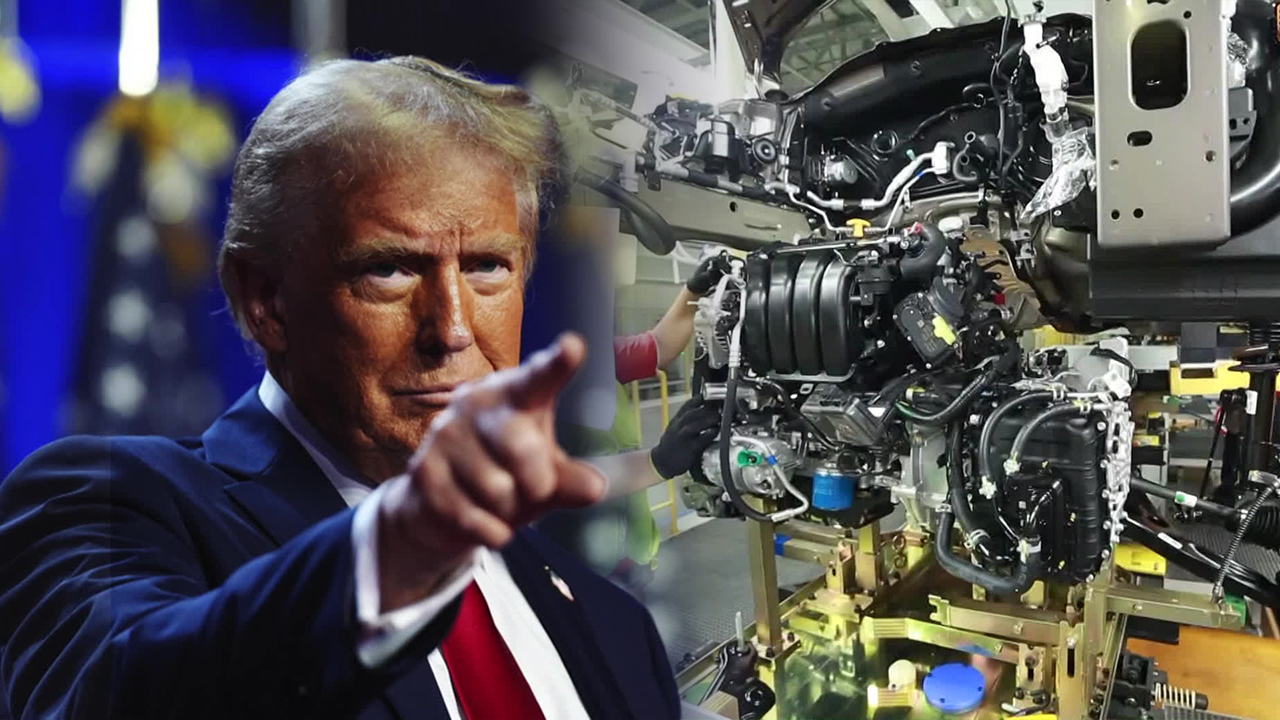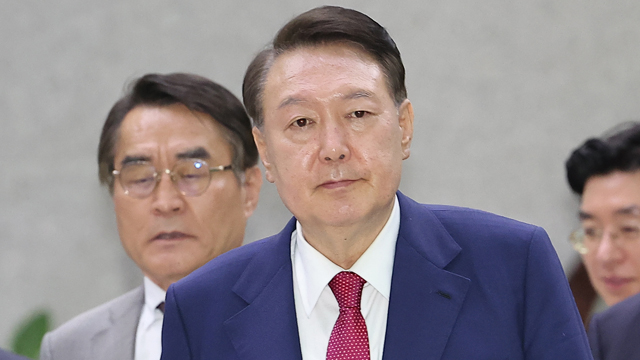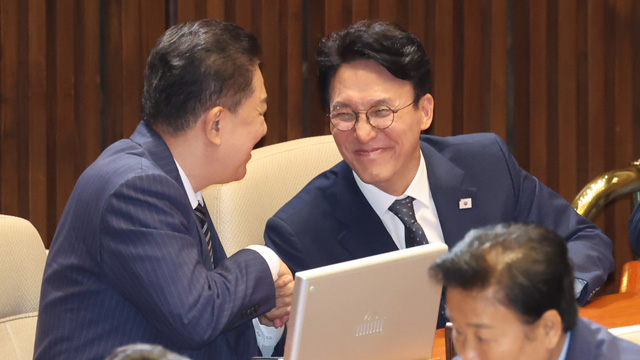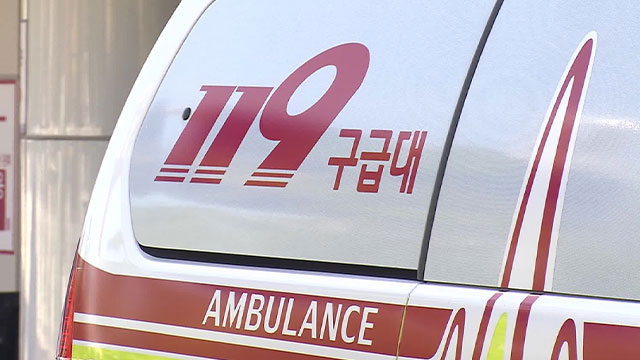[Anchor]
Which companies are the top two in U.S. home appliance sales?
They are Samsung Electronics and LG Electronics.
Both companies also hold the title of 'Best Washing Machine' as chosen by American consumers.
However, seven years ago, during the first Trump administration, they faced a significant crisis.
At that time, Trump specifically targeted 'Korean washing machines' with high tariffs, claiming he would revive the U.S. washing machine industry.
But our companies quickly expanded their local factories in the U.S. and was able to turn around.
However, the 'tariff bomb' has returned.
Now, companies are considering moving their factories from Canada and Mexico to the U.S. as a solution.
Can they achieve the same outcome again?
Reporter Hanuri has looked into this.
[Report]
The message from Trump is clear: make products sold in the U.S. in the U.S.
For our companies, this is a challenging request.
Both Canada and Mexico have lower production costs than the U.S., almost no export tariffs to the U.S., and are geographically closer, making them optimal for building factories.
There are already 132 of our companies in Canada and 92 in Mexico.
Manufacturing is the most prevalent sector.
In Mexico, Samsung Electronics and LG Electronics produce home appliances like TVs and refrigerators for the U.S. market.
Kia also manufactures cars for export to the U.S. here.
In Canada, our batteries are being produced.
With increased tariffs and additional pressure for investment in the U.S., the situation is becoming more complicated.
They are considering relocating factories to the U.S. again.
[Kim Chang-tae/LG Electronics Chief Financial Officer (CFO)/Last month’s management performance announcement: "We will utilize our know-how in operating production facilities in the U.S. to adjust production locations and capacities at existing sites...."]
However, this could ultimately only benefit the U.S.
[Joo Won/Director of Economic Research at Hyundai Research Institute: "The problem is that labor costs in the U.S. are quite high. I view it quite negatively whether that can cover the tariff costs efficiently."]
Previously, Samsung established a washing machine factory in the U.S.
Local promotions indicate that building the factory is not the only expense.
[Samsung U.S. YouTube: "Samsung does more. We donate to local schools (where the washing machine factory is located) and provide equipment."]
While investment in the U.S. is good, there are calls for other alternatives as well.
[Cho Sung-dae/Director of Trade Research at the Korea International Trade Association: "It is true that we need to increase efforts to develop alternative markets. In Korea, we should focus on producing high-value-added products and provide policy support for product technology development...."]
The Ministry of Trade, Industry and Energy held a task force meeting today (1.3) to respond to the U.S. and stated, "We will assess the trends of major countries and utilize all available resources to minimize damage."
KBS News, Hanuri.
Which companies are the top two in U.S. home appliance sales?
They are Samsung Electronics and LG Electronics.
Both companies also hold the title of 'Best Washing Machine' as chosen by American consumers.
However, seven years ago, during the first Trump administration, they faced a significant crisis.
At that time, Trump specifically targeted 'Korean washing machines' with high tariffs, claiming he would revive the U.S. washing machine industry.
But our companies quickly expanded their local factories in the U.S. and was able to turn around.
However, the 'tariff bomb' has returned.
Now, companies are considering moving their factories from Canada and Mexico to the U.S. as a solution.
Can they achieve the same outcome again?
Reporter Hanuri has looked into this.
[Report]
The message from Trump is clear: make products sold in the U.S. in the U.S.
For our companies, this is a challenging request.
Both Canada and Mexico have lower production costs than the U.S., almost no export tariffs to the U.S., and are geographically closer, making them optimal for building factories.
There are already 132 of our companies in Canada and 92 in Mexico.
Manufacturing is the most prevalent sector.
In Mexico, Samsung Electronics and LG Electronics produce home appliances like TVs and refrigerators for the U.S. market.
Kia also manufactures cars for export to the U.S. here.
In Canada, our batteries are being produced.
With increased tariffs and additional pressure for investment in the U.S., the situation is becoming more complicated.
They are considering relocating factories to the U.S. again.
[Kim Chang-tae/LG Electronics Chief Financial Officer (CFO)/Last month’s management performance announcement: "We will utilize our know-how in operating production facilities in the U.S. to adjust production locations and capacities at existing sites...."]
However, this could ultimately only benefit the U.S.
[Joo Won/Director of Economic Research at Hyundai Research Institute: "The problem is that labor costs in the U.S. are quite high. I view it quite negatively whether that can cover the tariff costs efficiently."]
Previously, Samsung established a washing machine factory in the U.S.
Local promotions indicate that building the factory is not the only expense.
[Samsung U.S. YouTube: "Samsung does more. We donate to local schools (where the washing machine factory is located) and provide equipment."]
While investment in the U.S. is good, there are calls for other alternatives as well.
[Cho Sung-dae/Director of Trade Research at the Korea International Trade Association: "It is true that we need to increase efforts to develop alternative markets. In Korea, we should focus on producing high-value-added products and provide policy support for product technology development...."]
The Ministry of Trade, Industry and Energy held a task force meeting today (1.3) to respond to the U.S. and stated, "We will assess the trends of major countries and utilize all available resources to minimize damage."
KBS News, Hanuri.
■ 제보하기
▷ 카카오톡 : 'KBS제보' 검색, 채널 추가
▷ 전화 : 02-781-1234, 4444
▷ 이메일 : kbs1234@kbs.co.kr
▷ 유튜브, 네이버, 카카오에서도 KBS뉴스를 구독해주세요!
- Samsung, LG weigh U.S. tariffs
-
- 입력 2025-02-04 00:24:50

[Anchor]
Which companies are the top two in U.S. home appliance sales?
They are Samsung Electronics and LG Electronics.
Both companies also hold the title of 'Best Washing Machine' as chosen by American consumers.
However, seven years ago, during the first Trump administration, they faced a significant crisis.
At that time, Trump specifically targeted 'Korean washing machines' with high tariffs, claiming he would revive the U.S. washing machine industry.
But our companies quickly expanded their local factories in the U.S. and was able to turn around.
However, the 'tariff bomb' has returned.
Now, companies are considering moving their factories from Canada and Mexico to the U.S. as a solution.
Can they achieve the same outcome again?
Reporter Hanuri has looked into this.
[Report]
The message from Trump is clear: make products sold in the U.S. in the U.S.
For our companies, this is a challenging request.
Both Canada and Mexico have lower production costs than the U.S., almost no export tariffs to the U.S., and are geographically closer, making them optimal for building factories.
There are already 132 of our companies in Canada and 92 in Mexico.
Manufacturing is the most prevalent sector.
In Mexico, Samsung Electronics and LG Electronics produce home appliances like TVs and refrigerators for the U.S. market.
Kia also manufactures cars for export to the U.S. here.
In Canada, our batteries are being produced.
With increased tariffs and additional pressure for investment in the U.S., the situation is becoming more complicated.
They are considering relocating factories to the U.S. again.
[Kim Chang-tae/LG Electronics Chief Financial Officer (CFO)/Last month’s management performance announcement: "We will utilize our know-how in operating production facilities in the U.S. to adjust production locations and capacities at existing sites...."]
However, this could ultimately only benefit the U.S.
[Joo Won/Director of Economic Research at Hyundai Research Institute: "The problem is that labor costs in the U.S. are quite high. I view it quite negatively whether that can cover the tariff costs efficiently."]
Previously, Samsung established a washing machine factory in the U.S.
Local promotions indicate that building the factory is not the only expense.
[Samsung U.S. YouTube: "Samsung does more. We donate to local schools (where the washing machine factory is located) and provide equipment."]
While investment in the U.S. is good, there are calls for other alternatives as well.
[Cho Sung-dae/Director of Trade Research at the Korea International Trade Association: "It is true that we need to increase efforts to develop alternative markets. In Korea, we should focus on producing high-value-added products and provide policy support for product technology development...."]
The Ministry of Trade, Industry and Energy held a task force meeting today (1.3) to respond to the U.S. and stated, "We will assess the trends of major countries and utilize all available resources to minimize damage."
KBS News, Hanuri.
Which companies are the top two in U.S. home appliance sales?
They are Samsung Electronics and LG Electronics.
Both companies also hold the title of 'Best Washing Machine' as chosen by American consumers.
However, seven years ago, during the first Trump administration, they faced a significant crisis.
At that time, Trump specifically targeted 'Korean washing machines' with high tariffs, claiming he would revive the U.S. washing machine industry.
But our companies quickly expanded their local factories in the U.S. and was able to turn around.
However, the 'tariff bomb' has returned.
Now, companies are considering moving their factories from Canada and Mexico to the U.S. as a solution.
Can they achieve the same outcome again?
Reporter Hanuri has looked into this.
[Report]
The message from Trump is clear: make products sold in the U.S. in the U.S.
For our companies, this is a challenging request.
Both Canada and Mexico have lower production costs than the U.S., almost no export tariffs to the U.S., and are geographically closer, making them optimal for building factories.
There are already 132 of our companies in Canada and 92 in Mexico.
Manufacturing is the most prevalent sector.
In Mexico, Samsung Electronics and LG Electronics produce home appliances like TVs and refrigerators for the U.S. market.
Kia also manufactures cars for export to the U.S. here.
In Canada, our batteries are being produced.
With increased tariffs and additional pressure for investment in the U.S., the situation is becoming more complicated.
They are considering relocating factories to the U.S. again.
[Kim Chang-tae/LG Electronics Chief Financial Officer (CFO)/Last month’s management performance announcement: "We will utilize our know-how in operating production facilities in the U.S. to adjust production locations and capacities at existing sites...."]
However, this could ultimately only benefit the U.S.
[Joo Won/Director of Economic Research at Hyundai Research Institute: "The problem is that labor costs in the U.S. are quite high. I view it quite negatively whether that can cover the tariff costs efficiently."]
Previously, Samsung established a washing machine factory in the U.S.
Local promotions indicate that building the factory is not the only expense.
[Samsung U.S. YouTube: "Samsung does more. We donate to local schools (where the washing machine factory is located) and provide equipment."]
While investment in the U.S. is good, there are calls for other alternatives as well.
[Cho Sung-dae/Director of Trade Research at the Korea International Trade Association: "It is true that we need to increase efforts to develop alternative markets. In Korea, we should focus on producing high-value-added products and provide policy support for product technology development...."]
The Ministry of Trade, Industry and Energy held a task force meeting today (1.3) to respond to the U.S. and stated, "We will assess the trends of major countries and utilize all available resources to minimize damage."
KBS News, Hanuri.
-
-

하누리 기자 ha@kbs.co.kr
하누리 기자의 기사 모음
-
이 기사가 좋으셨다면
-
좋아요
0
-
응원해요
0
-
후속 원해요
0















이 기사에 대한 의견을 남겨주세요.